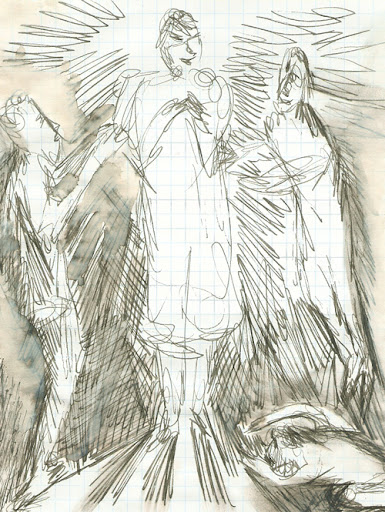One obvious question regarding `positive thinking': Who gets to decide what is `positive'? Let's paraphrase the obscure poet from the previous post, to arrive at:
There is nothing either positive or negative, but thinking makes it so.
#####
Now, to stay with Shakespeare, suppose there is something rotten in the state of Denmark (meaning our Spiritual Movement of course). What do you think will happen? A likely scenario: someone(s) with real commitment to making things better notices that there is something important not right. This person (these persons) will try to correct the issue, but if they are not in a position of power and the issue has been caused by people higher up in the Pyramid...then their efforts will be perceived as threatening to the position of these higher-up people.
Now the person trying to ameliorate things is caught between two grindstones. The denial of the Inner Circle (=the people high up in the Pyramid) is the top grindstone, and the bottom grindstone is ... the denial of the majority of followers. Because the followers are in the Movement for `positivity'. They want to believe in the purer-than-pure heart of the Leader, they want to believe in that God has granted Special Power to the Special Personality, and that they themselves are Special because they follow Him.
The followers cling to these beliefs because it offers them escape from the pangs of life. But then when someone criticizes either the Movement, the Pyramid, or the Leader...their rosy world is threatened.
And so, an emphasis on `positive thinking' & `no criticism' most often occurs in groups where there is a strong hierarchy and a tendency of `groupthink'. By `groupthink' I mean of course the phenomenon that everyone is encouraged to say the same (`positive') things, and critical, self-reliant thought is frowned upon.
#####
From this point, how far are we away from fundamentalism, from becoming a sect? Well, this is difficult to say. Most large government organizations tend to show the same mechanisms. Last weekend, a 2003 memo from the Dutch Ministry of Foreign Affairs resurfaced in a major newspaper. In the memo, the Legal Affairs Department advises the Minister that entry in the Iraq war is most likely illegal under international law.
It turns out the memo was blocked from reaching the Minister of Foreign Affairs by the Secretary-General of the Ministry. It was deemed untimely since the Legal Affairs Department had not been asked to give a `negative' advice. But it was archived, and resurfaced now that 5 years later the Senate is asking insistent questions about the legality of the Dutch participation in the war.
So, with or without any label of sect, inside or outside of spiritual movements and religions, I dare still say that `positive thinking' can be a pitfall. `Positive thinking' can be a power tool, used by the top of a Pyramid to smother criticism.
Is this an effective strategy?
#####
Well, yes, from the Pyramid's perspective. One might think not, because almost inevitably, in the end the truth will come out. At some time, the falsities will be exposed. You can fool some people some time, but you can't fool all the people all the time.
But the word `time' is of the essence in understanding why the strategy is still effective. Because by the time things are exposed, often the ones who stand to suffer from the exposure have moved on. Or they will say: `Ok ok, so we made some mistakes, LONG AGO, but let's stop arguing about who killed who...and please don't be so negative, we must look to the future and forget the past.'
In this way I have seen so incredibly many cover-ups, even clumsy ones, succeed.
#####
The one perspective from which the `positive thinking' strategy does not succeed, in my not so humble opinion, is the spiritual perspective.
Be truthful.
I cannot imagine any spirituality without such tenet. Truthful can mean praise as well as criticism. Truth is the opposite of denial. Truth means: open to criticism.
#####
The pitiful attempts by many so-called `spiritual' movements to stall criticism, to block criticism, to deny criticism are in my eyes a sure sign that such criticism is justified.
What to think of a memo sent by a member of the Working Committee of the Shri Ram Chandra Mission (Sahaj Marg) to the organizer of an orkut webcommunity on Sahaj Marg in Iran? (See here, where you can also see how this movement's Pyramid prefers people with positions of power in the secular world.)
Paraphrasing this memo:
`Dear brother, although your community serves 1500 people, we strongly urge you to remove your community because we fear it will be the target of individuals spreading misinformation about Sahaj Marg'.
Of course, webcommunities and blogs are new instruments to create open source exchange of information and ideas. And open, non-hierarchical exchange of ideas always threatens the Pyramid.
No surprise that spiritual movements (religions included) seek ways to maintain their Absolute Truth by denouncing open exchange.
Friday, January 23, 2009
Thursday, January 22, 2009
Positive thinking: a pitfall not only in spirituality
A comment on the previous post has set me thinking that it could be worthwhile to discuss the pitfall of `positive thinking'.
Regardless of the setting (spiritual or secular) I can be amused in more than one way to see the proponents of `positive thinking' advocating `positive thinking'. [These proponents would probably see my amusement as the positive way of looking at the phenomenon..;-)]. But it can also be a source of indignation, to see how these proponents can smother very essential criticism in a blanket of `oh don't be so negative'. [And this would be the negative way, I suppose.]
But first let me sketch a commonly occurring setting of positive thinking in our familiar Spiritual Movement:
`You have been given a wonderful opportunity for Liberation in this life. Our Spiritual Leader is awesome, He is Divinity Incarnate. God is wonderful. Praise Him and Him too (yes yes, God is male, just as the Leader).
Of course, since our Leader is so Wonderful, everything He does is Pure Miracle and Love. He didn't answer your letter when your child died? Well, be sure He read your letter, and worked on the Liberation of your child's soul, and worked on your soul too. With 300,000 followers, how can He physically read so much letters? Well, you see, you shouldn't apply logic to things of the heart. He reads them in His Heart. He works tirelessly on the cosmic scale, all that is necessary is done by His Grace.
Please avoid criticizing. This is all negative energy, blocking your spiritual progress. Instead, work on your inner Self, and cultivate Faith. You ask why our Leader criticizes us all the time? Dear brother, why do you persist in these negative attitudes? Do you think you can compare yourself to Him? You are but a slave of your negative tendencies, I will pray to Master for your spiritual uplifting.'
Sound familiar?
#####
Especially in spirituality however, the tireless advocating of positive thinking should ring some bells. Because is not balance a major tenet of spirituality?
Isn't it true in Nature, that where there is `positive' there is also `negative'? Isn't this the well-known dualistic plane, which we are supposed to transcend? I even seem to recall some obscure poet who said:
`...there is nothing either good or bad, but thinking makes it so.'
(to be continued)
Regardless of the setting (spiritual or secular) I can be amused in more than one way to see the proponents of `positive thinking' advocating `positive thinking'. [These proponents would probably see my amusement as the positive way of looking at the phenomenon..;-)]. But it can also be a source of indignation, to see how these proponents can smother very essential criticism in a blanket of `oh don't be so negative'. [And this would be the negative way, I suppose.]
But first let me sketch a commonly occurring setting of positive thinking in our familiar Spiritual Movement:
`You have been given a wonderful opportunity for Liberation in this life. Our Spiritual Leader is awesome, He is Divinity Incarnate. God is wonderful. Praise Him and Him too (yes yes, God is male, just as the Leader).
Of course, since our Leader is so Wonderful, everything He does is Pure Miracle and Love. He didn't answer your letter when your child died? Well, be sure He read your letter, and worked on the Liberation of your child's soul, and worked on your soul too. With 300,000 followers, how can He physically read so much letters? Well, you see, you shouldn't apply logic to things of the heart. He reads them in His Heart. He works tirelessly on the cosmic scale, all that is necessary is done by His Grace.
Please avoid criticizing. This is all negative energy, blocking your spiritual progress. Instead, work on your inner Self, and cultivate Faith. You ask why our Leader criticizes us all the time? Dear brother, why do you persist in these negative attitudes? Do you think you can compare yourself to Him? You are but a slave of your negative tendencies, I will pray to Master for your spiritual uplifting.'
Sound familiar?
#####
Especially in spirituality however, the tireless advocating of positive thinking should ring some bells. Because is not balance a major tenet of spirituality?
Isn't it true in Nature, that where there is `positive' there is also `negative'? Isn't this the well-known dualistic plane, which we are supposed to transcend? I even seem to recall some obscure poet who said:
`...there is nothing either good or bad, but thinking makes it so.'
(to be continued)
Sunday, January 18, 2009
Money & Power: the Spiritual Movement's Pyramid

Money & Power, the Spiritual Movement's Pyramid (own work, 2008)
Some important posts on this blog are on the pitfalls associated with Money, Power, the Spiritual Leader, the Pyramid (by which I mean the pyramidical organization of the Spiritual Movement).
After writing these posts, I changed an older sculpture of a bishop figure (I'm a visual artist) into a more disturbing comment on the way that spiritual movements (including religions) tend to function. Because a picture sometimes speaks a thousand words, I'm putting up a photograph of this sculpture.
In the sculpture one sees the Spiritual Leader (or perhaps his Manager?) on top of a dark, mostly opaque Pyramid, which in turn is based on a pedestal/dais-like elevation. The Spiritual Leader is dressed in full regalia, with a silver staff and other attributes of his position. As in the previous post, there is no real humility, here we have the CEO of the Money & Power machine.
If one looks closely, one sees that the Pyramid is filled with Money.

detail of Money & Power, the Spiritual Movement's Pyramid
There were several recent newspaper articles reporting on financial malversations and lack of transparency in a variety of spiritual movements. (To mention one: a long article in a leading Dutch newspaper on the complete lack of transparency regarding the wealth of the Vatican and the catholic church. Wealth which is conservatively estimated in the billions of euros. Yet churchgoers are asked time and again for their financial support, and catholic missionary posts keep asking money for all sorts of projects in the developing world.)
That these issues crop up again and again could cause occasional posts on this blog, even though the main analysis was completed already last September.
Labels:
bishop,
catholic church,
fund,
money,
power,
pyramid,
spiritual leader,
vatican
Thursday, January 15, 2009
The false guru

The false guru (own work, 2005)
The above drawing I made in 2005, after seeing a video of my former Sahaj Marg guru Chari. In this video he `gracefully' allowed people to fall at his feet, perhaps to kiss them even. To understand my indignation at this, one should know that Chari repeatedly stated that hís master never allowed people to fall at his feet, because this would be a false and impeding interpretation of the relationship.
This is not a blog about Sahaj Marg, but I do think it very illustrative of the way in which guru worship can take over the real spiritual issues. This I tried to analyze already in the posts on `spiritual guidance' (pitfall 1). But a picture speaks a thousand words. In the drawing, the false guru enjoys the fawning devotion and the illusion of a special light that radiates from `his presence'.
He doesn't display anger, or irritation like:
`Get up, you fool. What are you doing? Don't worship me, tend to your own inner master. By losing yourself in this outer form worship, you are running away from your spiritual self. Do you want to believe in fairy tales, or do you want to work on the real issues which are perhaps not so pretty but have the decided advantage of being real?'
He also doesn't display a single drop of true humility, modesty even. He only acts the part by folding his hands together, and putting on a serene expression.
#####
The drawing to me seems to capture what goes wrong when we start elevating somebody to the position of Guru, Spiritual Master with capital letters, Absolute (Moral) Authority, you name it.
What really happens is that we create fairy tales that `He' will somehow do our work for us. We experience bliss from this fairy tale, because -duh- now we don't have to do any real, likely confrontational, work on ourselves. Plus we are no longer responsible for the outcome!
Another downside to this transfer of responsibility is that the practicant opens her/himself up to a wide variety of manipulation. Not only from the Spiritual Leader, and the Movement's Pyramid, but also from her/his own subconsciousness.
####
Which is why I believe that a true spiritual guide would abhor any sign of worship. (S)he would relentlessly refuse to be put on any kind of pedestal (dais), be it physical or figuratively speaking.
In fact such a person would in my not so humble opinion most likely not call her/himself a spiritual guide at all (out of true modesty, and insight in the incomprehensibility of our existence). But people would turn to such a person nonetheless, without the elevation -which creates distance- and the worship and the false humility.
But it would not be in large numbers. Because then where to find the time and true attention which is the basis of any true relationship?
######
Please also check out the false guru test at energygrid.com, which was discussed to some extent in a previous post on fulfillment and spiritual progress.
Labels:
false guru,
guru worship,
pitfall 1,
Sahaj Marg,
spiritual guidance
Subscribe to:
Posts (Atom)
